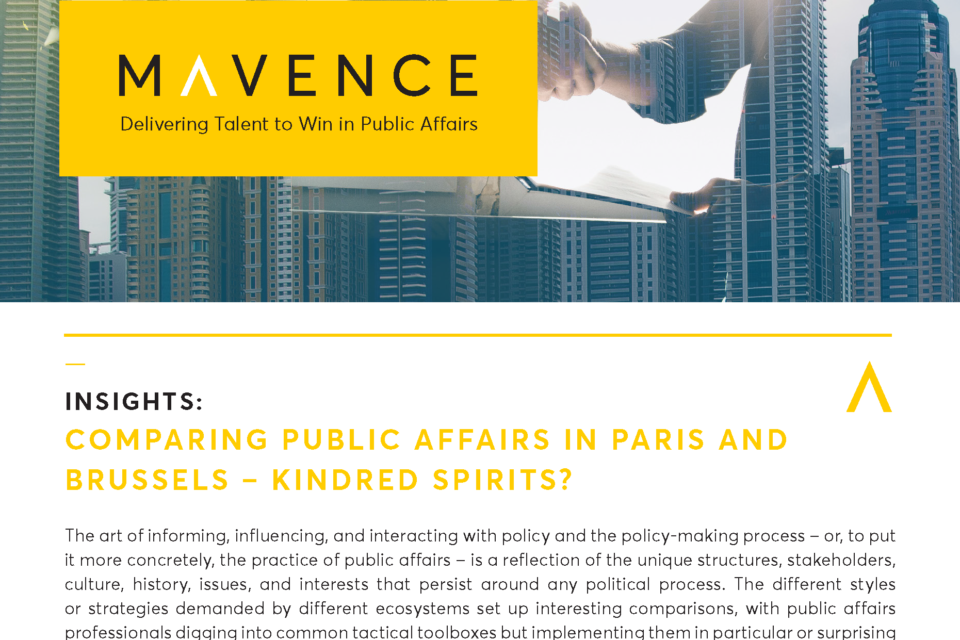As we come out of the summer break, the Brussels public affairs job market remains as dynamic as ever. While an increased pace of talent turn-over sees organisations continuously trying to adapt, growing recruitment needs and evolving employee expectations add new layers of challenge and opportunity. And all the while, a new trend is taking shape across the Brussels public affairs scene.
Zooming out, there seems to be a general understanding that we are past the exceptional Covid-related “crisis” mode that most organisations entered back in early 2020. Public affairs activities are steadily, albeit still somewhat shyly, going back to in-person meetings and events, and teams seem to be settling for some sort of a hybrid way of working with a few days per week of physical presence in the office. And yet, it is very clear that we’re not simply going back to how things were done before the pandemic. Senior leaders at multinational and local organisations alike are faced with a very clear need to develop new, future-fit paradigms of structuring work in their companies, associations, consulting firms or NGOs. And employees, with their evolving needs and sense of priorities, are becoming central to that process.
It is exciting to observe how many organisations in the Brussels public affairs world, regardless of size or sector, have started reflecting in a much more deliberate way about developing sustainable solutions – not only to attracting new talent, but also to retaining the talent they already have on board. Tools such as employee satisfaction surveys, regular employee touch points, but also organisational benchmarks and internal/external assessments are at the centre of many of our client discussions and an integral part of the strategic talent advisory solutions we build for them.
As we speak to hundreds of candidates, it becomes very clear that flexible working arrangements and higher salaries, while important, are not enough to keep people happy and fulfilled in their jobs. Tuning in to what your team is telling you and understanding how you compare to the market standards is an excellent first step in ensuring you keep up with the ever-evolving professional world and develop processes that can help you stay relevant as employer.
The next step is to act on the information you receive. One-off initiatives rarely have a desired impact. It is, therefore, important to think about how you can build into your system longer-term solutions and processes that are, on the one hand, universal enough to provide a common framework for sustained engagement and change, while also malleable enough to be adaptable to various situations and individual contexts. Recognising this has allowed many of our clients to appreciate the need for a structured support system: be it a tailor-made leadership onboarding programme, individual employee coaching, dedicated budget for team members’ professional trainings, or something more.
Equally interestingly, when talking to public affairs leaders it becomes clear that the increasingly complex policy agendas, which have become the norm in recent years, call for a deeper reflection on the structure of their teams and organisations. Considering innovative ways of engaging internal stakeholders (be it the Headquarters for corporates, or the Membership for associations) to create stronger links between teams in Brussels and other locations, better explain strategic importance of public affairs to the business, capitalise on mutual expertise and enhance overall effectiveness in addressing policy issues of key importance has become priority number one for many in top-level roles in Brussels. To a greater extent than ever before, offices, functions, and individuals are bridging geographies and influencing the inputs and outputs of public affairs.
This aligns neatly with a greater number of organisations deciding recently to review their organigrams, to ensure they are well equipped to connect with increasingly important and increasingly diverse external stakeholders – be they in academia, the general public, media, partner organisations or public institutions. For many, this is not always an easy exercise: more structural changes tend to significantly impact their budget planning and require securing a lot of internal buy-in – be it from the members or the business. In this context, understanding market standards and trends in depth, as well as one’s own position as compared to the competition, becomes crucial in building a compelling case study.
None of the above is completely new to the Brussels public affairs world, yet all of it has clearly become much more important in the course of the last months, prompting leadership in organisations to step out of the comfort zone of what “has been working well for years” and step into a much more strategic and proactive reflection on the meaning and value of the work they deliver to their stakeholders both internally and externally.
Anna Koj is Managing Director, Brussels at Mavence


